The old Southern preacher had walked through many airport security gates using his cherry-wood cane and was surprised – especially years before 9/11 – when a guard ordered him to send it through the X-ray scanner.
After that rite, the Rev. Will Campbell asked the guard to bring him the cane. The guard, somewhat miffed, asked if he could walk through the scanner without it. The preacher, somewhat vexed, said that was a question for his doctor.
Facing a nervous crowd, the guard ordered Campbell to walk through the gate. So the famous civil-rights activist – the only white leader the Rev. Martin Luther King Jr. invited to the first Southern Christian Leadership Conference meeting – got down on the floor and crawled through. Then he retrieved his cane.
Campbell admitted, when telling this parable to Baptist progressives in 1994, that he then gave the cane a "sassy little twirl." His wife asked: "Why do you do things like that?"
"Because, I'm a Baptist! I come from a long line of hell-raisers," said Campbell. "I was taught that I wasn't a robot – that I was a human being with a mind, capable of reason, entitled to read any book, including the Bible, and interpret it according to the ability of the mind I was given. That's why I do things like that."
The key, he said, is to ask what happened to all the Baptists who kept clashing with authority figures in the past. Where are the Baptists who were willing to be "tied on ladders and pushed into burning brush heaps because they believed in and practiced freedom of conscience," who "were so opposed to the death penalty they wouldn't serve on juries" and who "would not go to war, any war, for church or state? ... Where are they now?"
Campbell, he died last month at the age of 88, was a complex activist and writer who made lots of people mad for lots of reasons. Raised in rural Mississippi, he thrived at Yale Divinity School and failed as a small-town pastor. He accompanied the Freedom Riders in 1961 and marched in Birmingham in 1963. He tried to avoid reporters, but was tight with country-music rebels like Johnny Cash and Waylon Jennings. He opposed both abortion and the death penalty and, late in life, backed gay rights.
The self-proclaimed "bootleg Baptist" spent his life preaching forgiveness and reconciliation, yet also called religious conservatives "ecclesiastical highwaymen" who were "espousing a course that is a rollercoaster to a fascist theocracy." Pushed to summarize his theology he stated: "We're all bastards, but God loves us anyway."
"Will was fond of saying that if you are going to love one then you have to love everyone. ... This meant rednecks as well as radicals," wrote the Rev. Timothy George, for the conservative "First Things" journal. He is the dean of Beeson Divinity School in Birmingham, Ala., and a former member of Campbell's Committee of Southern Churchmen.
Campbell "infuriated many," George added, "when he befriended members of the Ku Klux Klan and even visited James Earl Ray in prison. Campbell wrote: 'I have seen and known the resentment of the racist, his hostility, his frustration, his need for someone upon whom to lay blame and to punish. With the same love that we are commanded to shower upon the innocent victim, the church must love the racist.'
"The fact is Will Campbell was simply sui generis. He cannot be comfortably squeezed into anyone's box."
In the end, the only box Campbell accepted was a Baptist box that fit his own iconoclastic specifications – rejecting all creeds, traditions and hierarchies.
"Institutions, by their very definition, are evil," he said, in that 1994 address. "Their raison-d'etre is always and inevitably self-survival. They, all of them, when they are threatened will go to any length, tell any lie, engage in any program to protect themselves. And justify it as being in defense of Almighty God."
For Baptists to be true Baptists, he said, it's crucial for them to teach that Jesus never "demanded of the people who wanted to follow him that they must first know this or that, this creed, or that catechism, the nature of the Trinity or the plan of salvation, or subscribe to an Abstract of Principles to the satisfaction of the Sanhedrin. He had not insisted on any systematic belief whatsoever."







